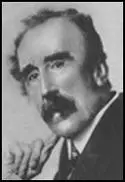Percy Hetherington Fitzgerald

Percy Hetherington Fitzgerald was born in Ireland in 1834. He was educated at Stonyhurst College in Hurst Green and at Trinity College, Dublin. Fitzgerald qualified as a lawyer and worked as a crown prosecutor on the northeastern circuit.
Fitzgerald moved to London and became a journalist. In February 1850, Charles Dickens decided to join forces with his publisher, Bradbury & Evans, and his friend, John Forster, to publish the journal, Household Words . Fitzgerald became a regular supplier of articles to the journal. Other contributors included William Henry Wills, Edmund Yates, Douglas Jerrold, Blanchard Jerrold, Wilkie Collins, Eliza Lynn Linton and George Augustus Sala. Fitzgerald later commented on the way Dickens edited the journal: "the way he used to scatter his bright touches over the whole, the sparkling word of his own that he would insert here and there, gave a surprising point and light."
Claire Tomalin, the author of Dickens: A Life (2011): "Dickens surrounded himself with clever young men, aspiring writers who were eager to learn from him and ready to flatter: Edmund Yates, George Sala, Percy Fitzgerald, an Irish lawyer with a fluent pen, and John Hollingshead, a largely self-taught journalist who later became a theatre manager. Dickens gave them work, corrected and improved their copy, was a good friend to them and dined them well."
In June, 1858, Charles Dickens decided to issue a statement to the press about the rumours involving him and two unnamed women (Ellen Ternan and Georgina Hogarth): "By some means, arising out of wickedness, or out of folly, or out of inconceivable wild chance, or out of all three, this trouble has been the occasion of misrepresentations, mostly grossly false, most monstrous, and most cruel - involving, not only me, but innocent persons dear to my heart... I most solemnly declare, then - and this I do both in my own name and in my wife's name - that all the lately whispered rumours touching the trouble, at which I have glanced, are abominably false. And whosoever repeats one of them after this denial, will lie as wilfully and as foully as it is possible for any false witness to lie, before heaven and earth."
Dickens also made reference to his problems with Catherine Dickens: "Some domestic trouble of mine, of long-standing, on which I will make no further remark than that it claims to be respected, as being of a sacredly private nature, has lately been brought to an arrangement, which involves no anger or ill-will of any kind, and the whole origin, progress, and surrounding circumstances of which have been, throughout, within the knowledge of my children. It is amicably composed, and its details have now to be forgotten by those concerned in it."
Fitzgerald later recalled that "people were all but bewildered and almost stunned... Everyone was for the most part in supreme ignorance of what the document could possibly refer to... the delusion that all of his readers had heard of some particular slander that had grown out of the domestic trouble, the fact being that nearly everyone who had read the dark allusion was in the completest ignorance".
Fitzgerald also became a drama critic of The Sunday Observer. He also wrote a series of biographies. This included books on Laurence Sterne (1864), Charles Lamb (1866), David Garrick (1868), George IV (1881), William IV (1884) Richard Brinsley Sheridan (1886) and Henry Irving (1893).
Most of these books were published by Chapman and Hall. He later commented on the managing director of the company, Frederic Chapman: "An excellent fellow he was somewhat blunt and bluff, but straightforward and good-natured. On his shoulders, even when Edward Chapman was alive, lay the burden. He was a tall, burly, rubicund man, and had good business instinct. He had a small but delightful house in Ovington Square, to which some one had added a billiard-room, which he turned into a charming dining-room."
He also published several books on the history of the theatre. This included The Romance of the English Stage (1874), A New History of the English Stage (1882) and The Operas of Gilbert & Sillivan (1894). A great friend of Charles Dickens he published Memories of Charles Dickens in 1914.
Percy Hetherington Fitzgerald died in 1925 and is buried in Glasnevin Cemetery.
Primary Sources
(1) Percy Fitzgerald, Boz and his Publishers (1907)
An excellent fellow he was somewhat blunt and bluff, but straightforward and good-natured. On his shoulders, even when Edward Chapman was alive, lay the burden. He was a tall, burly, rubicund man, and had good business instinct. He had a small but delightful house in Ovington Square, to which some one had added a billiard-room, which he turned into a charming dining-room. What tasty Lucullus-like dinners were given there! I cannot say how he managed the firm, but when Dickens was alive he tried to meet his wishes in every conceivable way.
(2) Claire Tomalin, Dickens: A Life (2011)
Dickens surrounded himself with clever young men, aspiring writers who were eager to learn from him and ready to flatter: Edmund Yates, George Sala, Percy Fitzgerald, an Irish lawyer with a fluent pen, and John Hollingshead, a largely self-taught journalist who later became a theatre manager. Dickens gave them work, corrected and improved their copy, was a good friend to them and dined them well.
